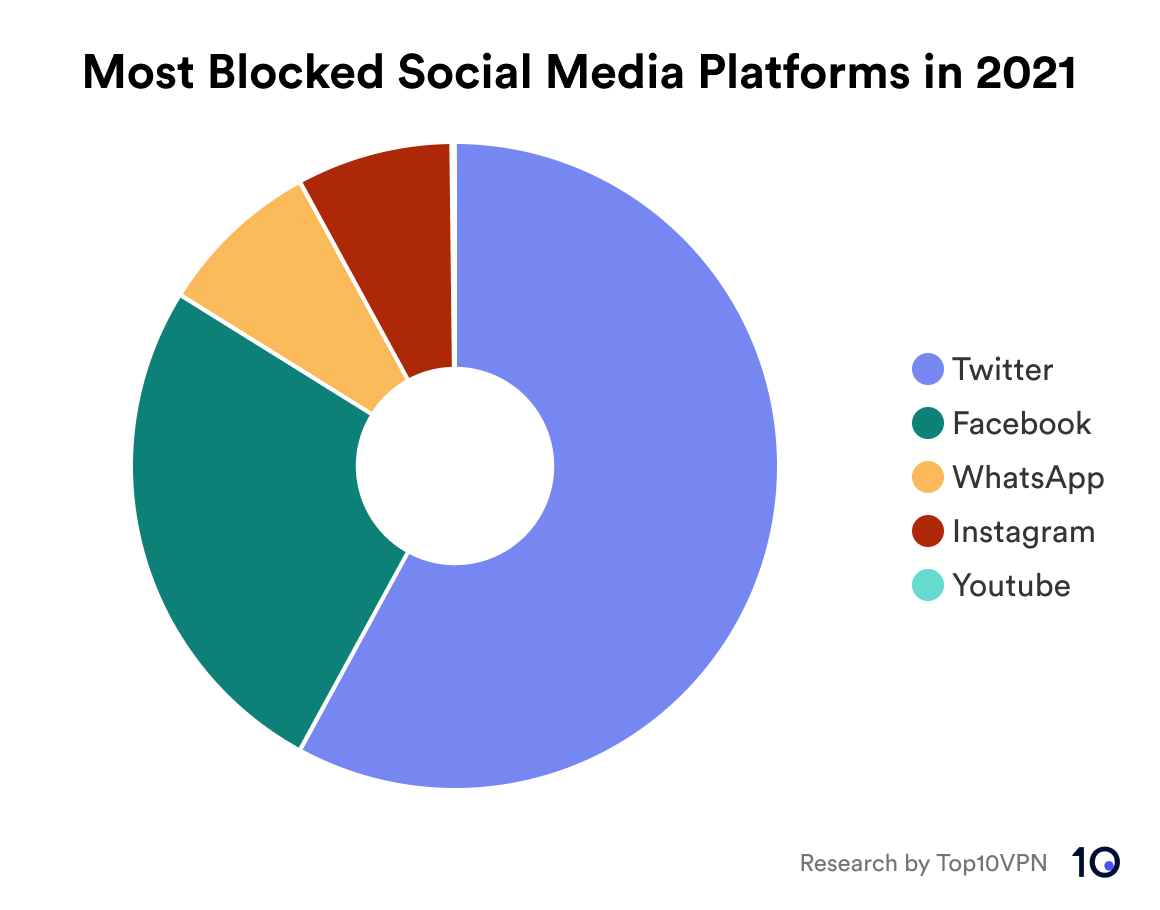Government Internet Shutdowns Cost $5.6 Billion in 2021
Our annual report analyzes every major intentional internet shutdown in 2021 and reveals that they cost a world economy a further $5.6 billion.
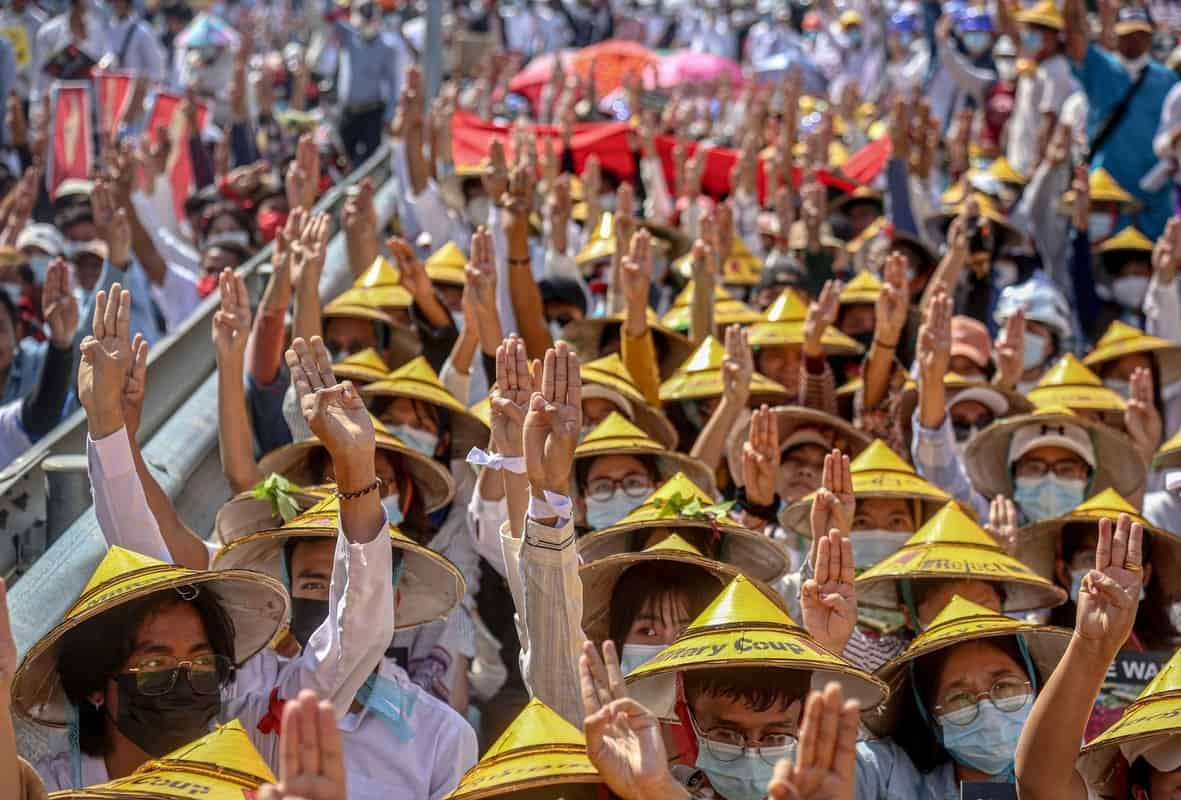
Internet Shutdowns: Economic Impact 2021
- $5.62 billion: economic cost of internet shutdowns in 2021, up 40% from 2020
- 51 major internet outages took place in 22 countries
- 34,595 hours of government internet disruptions
- Internet blackouts: 16,574 hours
- Internet throttling: 840 hours
- Social media blocks: 17,182 hours
- 504.4 million people affected by deliberate internet outages in 2021, up 88% year-on-year
- Twitter: the most blocked social media platform, suffering 17,302 hours of deliberate disruption – over 120% more than Facebook.
- Myanmar: the single most affected nation ($2.8 billion), followed by Nigeria ($1.45 billion) and India ($583 million).
- Human rights impact: 73% of government internet outages were associated with additional human rights abuses, an increase of almost 80% compared with 2020:
- 69% of all internet disruptions were also associated with restrictions on freedom of assembly
- 29% with election interference
- 29% with infringements on freedom of the press
What is the Cost of Internet Shutdowns Report?
This Global Cost of Internet Shutdowns report calculates the total economic impact of every major deliberate internet outage and social media shutdown around the world in 2021.
This kind of deliberate disruption is internet censorship in its most extreme form. Not only do these government internet outages infringe on citizens’ digital rights but they are also reckless acts of economic self-harm.
The data table below shows the country-by-country breakdown of the global cost of internet shutdowns in 2021.
Government internet outages in 22 countries lasting almost 35,000 hours cost the global economy $5.62 billion in 2021, a 40% increase in impact compared to 2020.
Since 2020, we have also collated the additional human rights abuses perpetrated during these internet disruptions. We have highlighted these abuses in order to illustrate the wider context in which these incidents of extreme internet censorship take place.
How Do We Calculate The Cost of Internet Shutdowns?
We monitor every national and region-wide deliberate internet outage and social media shutdown imposed by governments around the world in order to determine the duration and extent of the restrictions. This allows us to accurately calculate the economic impact of each internet shutdown using the COST tool.
This tool was developed by internet monitoring NGO Netblocks. It is based on indicators from the World Bank, ITU, Eurostat and US Census.
In our Cost of Internet Shutdowns reports, we include social media shutdowns, internet blackouts and severe internet throttling in our calculations. These three types of internet outage are defined as follows:
- Internet blackouts: where internet access is completely cut off by the government. This extreme measure cannot be directly circumvented.
- Social media shutdowns: where access to popular social media, such as Facebook, WhatsApp or Twitter has been blocked. These can typically be circumvented by using a Virtual Private Network (VPN).
- Severe throttling: where speeds have been reduced to 2G, which permits the use of SMS and voice calls only. This is an internet blackout in all but name.
Why Are We Tracking The Cost of Internet Shutdowns?
We are fiercely opposed to internet censorship and governments withholding access to the internet as a form of social control.
Our goal in doing this work is to keep public attention focused on just how damaging internet shutdowns truly are. This damage is both direct, in terms of the economic and human cost, and indirect, in that it forces people to use unsafe VPNs to try to circumvent the restrictions imposed upon them.
Internet Shutdowns 2021: Cost by Region
The following data table shows the total economic cost of all major internet shutdowns in 2021 broken down by the global region where the disruptions occurred. The data table is ordered from greatest to least economic impact, measured in USD.
The bar chart below shows the economic impact of all major internet shutdowns in 2021 on each of the global regions where the disruptions occurred, broken down by context, i.e. the reason why the internet outage was implemented.
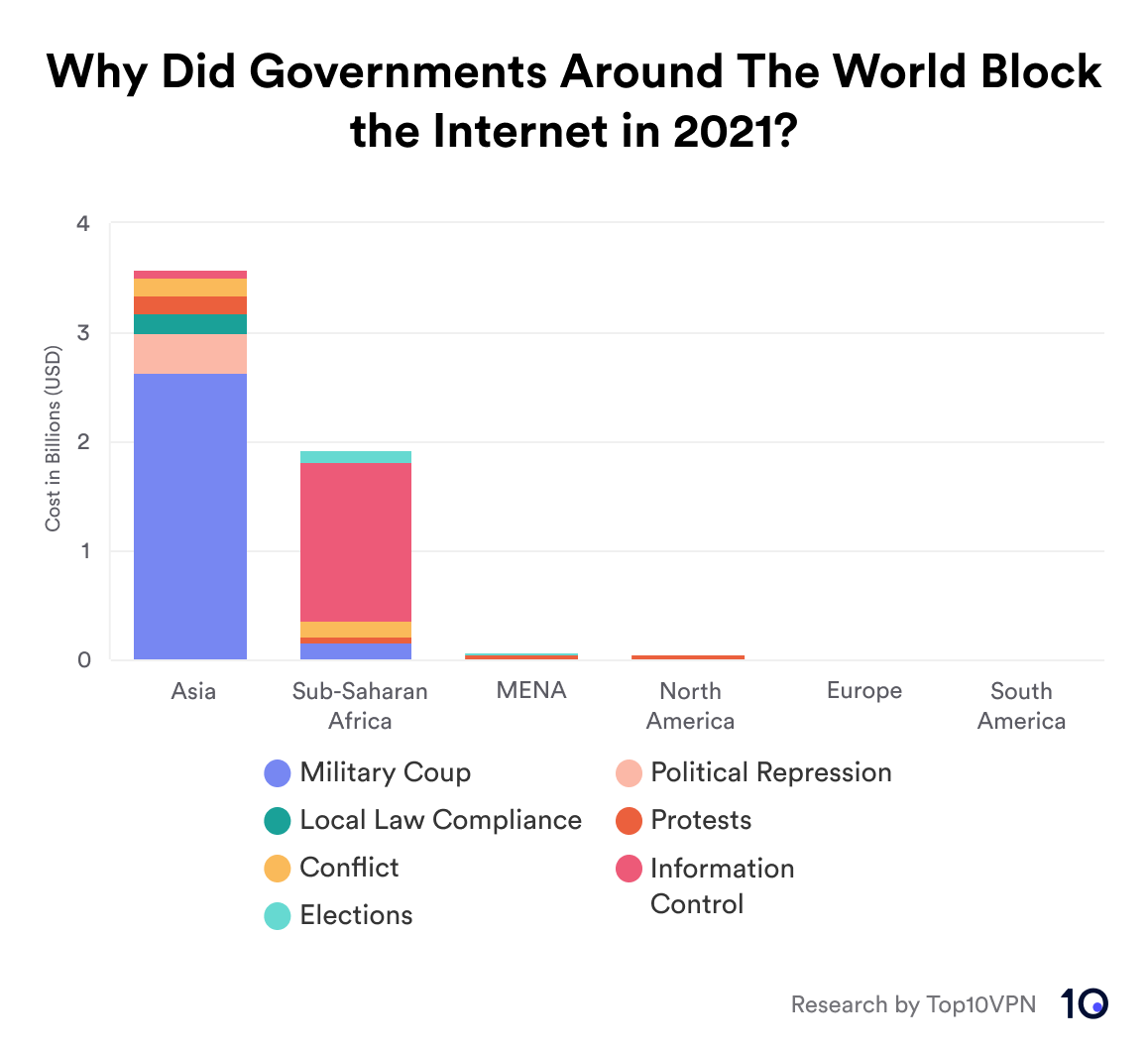
Bar chart showing the most expensive reasons for internet shutdowns in 2021 by global region.
Internet Shutdowns 2021: Cost by Country
The following data table shows all countries that have experienced a major internet shutdown in 2021. The table is ordered from greatest to least economic impact, measured in USD.
The data table also indicates the nature of any additional human rights abuses perpetrated during each internet shutdown. A cross indicates that the human right specified was violated during the period around the internet outage.
For data on individual internet shutdowns, see the Cost of Internet Shutdowns Tracker Data Sheet.
Internet Shutdowns 2021: Cost by Context
The following data table shows the total economic cost of all major internet shutdowns in 2021 grouped by context, i.e. the nature of what prompted local authorities to cut internet access. The data table is ordered from greatest to least economic impact, measured in USD.
The data table also indicates the number of incidents in each category and the total duration of deliberate internet outages in hours.
The following chart shows split of the economic cost of all major government internet outages in 2021 by context, i.e. the nature of what prompted local authorities to cut internet access.
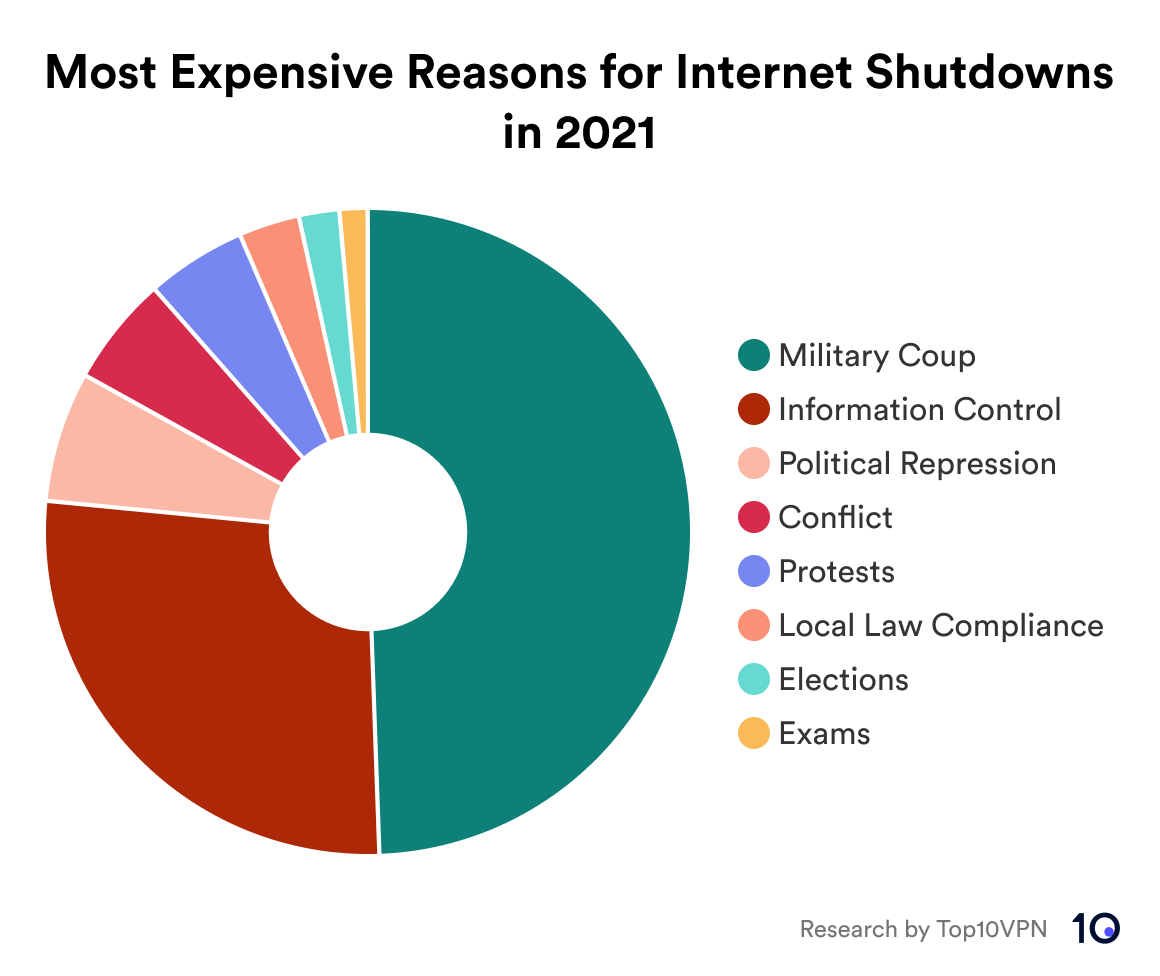
Donut chart showing the reasons for internet shutdowns in 2021 with the most economic impact
The following chart shows the split of reasons for all major government internet outages in 2021 by frequency.
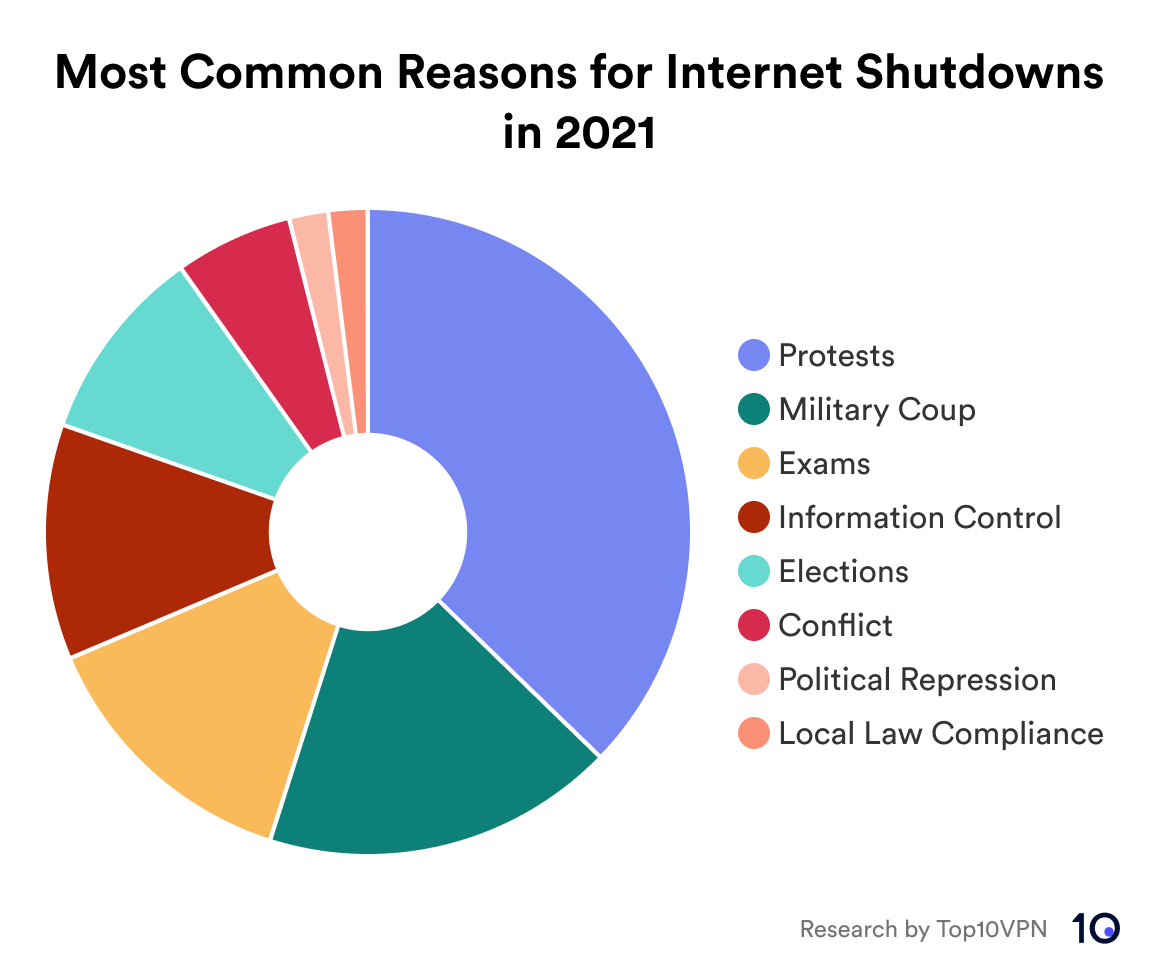
Donut chart showing the most common reasons for internet shutdowns in 2021
Internet Shutdowns Background 2021
This section of the report examines the circumstances around each instance of governments cutting or restricting internet access.
We have looked at each country individually and broken out the duration of each type of internet outage. We have also identified the nature of any additional human rights abuses associated with the government internet outages.
Countries are ordered and grouped according to the overall economic impact of their government’s internet restrictions over the course of 2021.
Use the following links to jump straight to the relevant country-by-country section:
- Internet shutdowns costing over $500 million
- Internet shutdowns costing $100-$500 million
- Internet shutdowns costing $10-$100 million
- Internet shutdowns costing $1-$10 million
- Internet shutdowns costing under $1 million
Countries with Internet Shutdown Costs Over $500 Million
Myanmar
- Internet blackout: 5,637 hours
- Social media shutdown: 6,601 hours
- Total cost of internet restrictions: $2.78 billion
- Human rights abuses: Right to peaceful assembly, election interference, freedom of press
The most severe internet outages in 2021 were in Myanmar, following nationwide protests over a military coup in February. After an initial internet blackout, the ruling military junta blocked access to Facebook in the wake of the coup in order to “maintain stability”.[1]
Demand for VPN services immediately skyrocketed by 7,200% as protestors sought to regain access to Facebook, which had been central in organizing the civil resistance to the coup.
Rolling internet restrictions followed across Myanmar. The junta blocked social media during the day and completely shut down all internet access each night for 72 consecutive nights until 27 April.
Mobile internet in Myanmar was cut completely in March while wireless internet access was cut in April 1.[2] Internet access was partially restored after these outages at the end of May but has been limited since then to government-approved websites and mobile apps only.[3] Facebook and Twitter are not on the offical “allowlist” and access has only been possible via VPN since then, according to local sources.
The internet outages and social media restrictions were deployed as part of a crackdown on dissent that has claimed a significant number of protestors’ lives.[4]
The junta has also shut down internet access, along with phones, in 30 townships in the Kachin, Chin, Sagaing, Magway and Mandalay regions since late August and September, as fighting intensified between the military and the People’s Defence Force militias in those areas.
Nigeria
- Social media shutdown: 5,040 hours
- Total cost of internet restrictions: $1.45 billion
The Nigerian government blocked access to Twitter in June.[5] The initially indefinite ban followed Twitter’s removal of a tweet by President Muhammadu Buhari that was in breach of the social media platform’s rules.[6]
Demand for VPN services soared by 1,409% as citizens sought to bypass the social media restrictions. The surging interest in VPN services defied threats by the Nigerian attorney general to prosecute those who ignored the Twitter ban.[7]
In October, the Nigerian government announced Twitter access would be restored after 122 days, on condition that the platform was used for business and positive engagements”.[8] However these conditions had still not been met by the end of the year.
The Twitter ban was finally actually lifted after 222 days on January 12 2022, with a total cost of $1.54 billion to the Nigerian economy.
India
- Internet blackout: 317.5 hours
- Bandwidth throttling: 840 hours
- Total cost of internet restrictions: $582.8 million
- Human rights abuses: Right to peaceful assembly, election interference, freedom of press
The Indian government again imposed more costly internet outages than almost any other nation. The biggest economic hit came from throttling internet speeds in Kashmir, where authorities finally restored normal internet access in February after 18 months.[9]
The intentional slowdown to 2G speeds rendered the internet in Kashmir functionally near-useless, causing education and business to suffer during a pandemic that made everyone more dependent on reliable internet access.[10]
In late January, the government imposed a costly localized internet blackout in Delhi in response to the large-scale farmers’ protest. Reports that police fired teargas and savagely beat protesters circulated despite the internet outage.[11]
Other incidents of internet blackouts again revolved around controlling the flow of information online in Kashmir, after the death of a prominent separatist leader.[12] Rajasthan’s internet was shut down in September to prevent exam cheating.[13]
Countries with Internet Shutdown Costs Of $100 – $500 Million
Uzbekistan
- Social media shutdowns: 4,416 hours
- Total cost of internet restrictions: $170.9 million
Uzbekistan authorities blocked access to a number of social media platforms as a result of new laws that came into effect in April 2021 that required the user data of Uzbek citizens to be physically processed and stored within Uzbekistan.
Access to Twitter, along with WeChat, VKontakte and TikTok were blocked in July and remained inaccessible into 2022. Facebook, Telegram and YouTube were also briefly blocked in November but became available again after the president intervened and reversed the decision.[56]
Ethiopia
- Internet blackout: 8,760 hours
- Social media shutdowns: 104 hours
- Total cost of internet restrictions: $164.5 million
- Human rights abuses: Right to peaceful assembly
The ongoing internet outage in Ethiopia’s Tigray region has been used as a weapon to control information since the onset of a vicious civil war that has ravaged the region for over a year.[14]
Despite the communications blackout, evidence of mass rape and the massacre of scores of civilians has been brought to light.[15] Reports of Ethiopian journalists being arrested on “alleged media related offences” have also emerged.[16]
The government blocked access to Facebook, WhatsApp and Instagram nationwide in May. Another social media block following the leak of exam papers online led to a 5,109% surge in demand for VPN services.
Sudan
- Internet blackout: 605 hours
- Social media shutdowns: 172 hours
- Total cost of internet restrictions: $157.4 million
- Human rights abuses: Right to peaceful assembly & freedom of press
The Sudan government imposed a series of severe internet outages in October that lasted until late November. Authorities first briefly blocked social media on October 15 as thousands of demonstrators called for the military to seize power from long-standing President Omar al-Bashir.[17]
An unusually long full internet shutdown followed, as part of a total communications blackout, from October 25. Internet access was finally restored on November 18. Authorities continued to block social media for a further week.[18]
The internet blackout failed to prevent the eventual emergence of video footage of security personnel detaining and using lethal force against pro-democracy protesters and journalists.[19]
Authorities cut mobile internet access on Christmas Day and on December 30, ahead of planned pro-democracy protests in Khartoum. The ensuing security crackdown led to the deaths of five protestors.
Earlier in the year, Sudan’s education authorities blocked mobile internet access in June during national exams for a second year running.[20]
Uganda
- Internet blackout: 118 hours
- Social media shutdowns: 573.5 hours
- Total cost of internet restrictions: $109.7 million
- Human rights abuses: Right to peaceful assembly & election interference
The Ugandan government imposed an internet blackout a day before polls opened for the presidential elections in January after blocking social media, including Twitter, Facebook, WhatsApp, Instagram, two days earlier.[21]
VPN demand surged by 1,343% during the social media restrictions as Ugandans tried to bypass the government censorship.
Internet access was restored on January 18, however social media remained blocked until February 10.
The internet outages aimed to prevent the spread of details of the lethal government crackdown on critics of President Musevini’s 35-year-reign. At least 54 people were killed and opposition leader Bobi Wine was detained multiple times prior to polling day, amid accusations of government vote-rigging.[22][23]
Countries with Internet Shutdown Costs Of $10 – $100 million
Bangladesh
- Internet blackout: 12 hours
- Social media shutdowns: 48 hours
- Total cost of internet restrictions: $49.7 million
- Human rights abuses: Right to peaceful assembly
Authorities blocked access to Facebook and Facebook Messenger in March amid protests over a state visit by Indian Prime Minister Narendra Modi.[24][25] We recorded a 738% spike in demand for VPNs as Bangladeshis sought to circumvent the social media block.
The Bangladesh government cut mobile internet access in October, after a series of attacks on sites of worship took place across the country.[26]
Burkina Faso
- Internet blackout: 192 hours
- Total cost of internet restrictions: $35.9 million
- Human rights abuses: Right to peaceful assembly
Burkina Faso authorities shut down mobile internet access for over a week in late November, citing legal requirements for “national defense” and “public safety”. The internet outage was imposed amid heightened social unrest sparked by the shooting of protesters by a French military convoy en route to Niger.[27][28]
Cuba
- Internet blackout: 8 hours
- Social media shutdowns: 168 hours
- Total cost of internet restrictions: $33.1 million
- Human rights abuses: Right to peaceful assembly & freedom of press
The Cuban authorities imposed nationwide internet outages intermittently during July following the largest anti-government protests in Cuba for decades. This included blocking access to Facebook, Instagram and WhatsApp.[29]
More than 100 protesters were arrested during the protests, including independent journalists.[30]
Cuba’s president defended cutting internet access, blaming the U.S. for inciting social unrest through a Twitter campaign using the hashtag #SOSCuba.[31]
Syria
- Internet blackout: 103.5 hours
- Total cost of internet restrictions: $28.6 million
The Syrian government imposed a series of national internet blackouts as 250,000 students sat national examinations from May 19 to 22 June. Education authorities in Syria have been disrupting internet access in this way since 2016 to prevent exam questions being leaked online.[32]
“The Syrian government should stop this extremely disproportionate use of internet shutdowns to address exam cheating” – Access Now[34]
Iran
- Internet blackout: 408 hours
- Total cost of internet restrictions: $27.5 million
- Human rights abuses: Right to peaceful assembly
Authorities cut internet access in regions of Iran three times as a result of protests in 2021. In February, a deliberate internet outage in the impoverished Sistan and Baluchistan province hindered footage emerging of lethal state force against demonstrators.[35]
Mobile internet access was cut in Khuzestan province for 288 hours in July, during widespread protests over severe water shortages.[36]
A further internet shutdown was imposed in Ahvaz in November, as violence erupted, again over water.[37]
Countries with Internet Shutdown Costs Of $1 – $10 Million
Armenia
- Internet blackout: 41 hours
- Total cost of internet restrictions: $8.3 million
The Armenian government deliberately shut down internet access for almost two full days in February, amid claims of an alleged coup attempt against Prime Minister Nikol Pashinyan.[38]
The Armenian leader had been facing fierce opposition pressure to step-down after months-long protests over his handling of a six-week war with Azerbaijan.[39]
Colombia
- Internet blackout: 24 hours
- Total cost of internet restrictions: $6.1 million
- Human rights abuses: Right to peaceful assembly
Authorities in the Cali region of Colombia shut down the internet in May for 24 hours, amid demonstrations over tax hikes that had turned deadly.[40][41]
The internet outage led to demand for VPN services increasing by 148% nationally compared to the week prior.
eSwatini
- Internet blackout: 216 hours
- Social media shutdown: 2 hours
- Total cost of internet restrictions: $2.9 million
- Human rights abuses: Right to peaceful assembly
The eSwatini government cut internet access in late June in response to large-scale pro-democracy protests in Africa’s only remaining absolute monarchy.[42]
Authorities also briefly blocked Facebook, WhatsApp and Twitter in October, as anti-monarchy tensions boiled over and accounts of police brutality and use of live ammunition against citizens continued to surface.[43]
Pakistan
- Social media shutdown: 3 hours
- Total cost of internet restrictions: $2.6 million
- Human rights abuses: Right to peaceful assembly
The government blocked access to Facebook, Twitter, WhatsApp, YouTube and Instagram in April to prevent banned hardline opposition group Tehreek-e-Labaik Pakistan (TLP) from further inflaming the unrest that was rocking Pakistan as a result of the publication of blasphemous cartoons in France.[44][45]
Republic of the Congo
- Internet blackout: 72 hours
- Total cost of internet restrictions: $2.5 million
- Human rights abuses: Election interference
Authorities blocked internet access in the Republic of the Congo during the country’s presidential elections in March.[46] This was a repeat of the ruling party’s actions in March 2016, suggesting a deliberate strategy of cutting internet access during politically sensitive moments.
Despite ensuing concerns over vote-rigging and lack of transparency, the United Nations and European Union observers were barred from monitoring the elections, in which President Denis Sassou N’Guesso successfully extended his 36-year-rule.[47]
Zambia
- Social media shutdown: 48 hours
- Total cost of internet restrictions: $1.8 million
- Human rights abuses: Election interference
The Zambian government blocked social media in August as the country headed to the polls for presidential and parliamentary elections. Facebook, Instagram, Twitter and WhatsApp were all restricted amid political intimidation and violence.[48][49]
Zambian citizens hoping to bypass their government’s internet censorship, turned en masse to VPN services. We recorded a 16,341% increase in VPN demand compared to the weeks leading up to the internet outage.
Chad
- Internet blackout: 29.5 hours
- Total cost of internet restrictions: $1.6 million
- Human rights abuses: Right to peaceful assembly, election interference
Authorities in Chad shut down internet access in February to prevent information from emerging about a deadly raid at opposition candidate Yaya Dillo’s house a month before presidential elections were due to take place.[50][51]
Countries with Internet Shutdown Costs Below $1 Million
In Russia, the government blocked mobile internet access for six hours in Moscow and St. Petersburg in January following protests over the detention of opposition leader Alexei Navalny. As many as 3,000 people were detained,[52] in the largest protest Russia has seen in recent years.
The Senegal government blocked access to Facebook, YouTube, WhatsApp and Telegram in March amid police clashes with protesters in the capital city of Dakar.[53]
Authorities in South Sudan shut down internet access in August ahead of planned anti-government protests, as the country prepared to inaugurate a new parliament.[54] This extreme internet censorship was accompanied by threats of a tough crackdown on protestors.[55]
Internet Shutdowns Research Methodology
We review every documented government internet outage and social media shutdown globally in a given year.
We include deliberate national internet shutdowns along with regional disruptions that are on a sufficient scale to be economically significant.
The nature, duration and severity of each internet outage are sourced from Netblocks real-time graphic data and reports, IODA and the SFLC.IN Internet Shutdown Tracker.
The economic cost of each internet shutdown is calculated using the Netblocks Cost of Shutdown Tool, which is based on the Brookings Institution method, with CIPESA’s specialized model used for sub-Saharan Africa. Regional shutdown costs are derived from the region’s economic output as a proportion of national GDP.
Partial internet outages are calculated as a proportion of the above costs based on the most up-to-date internet market-share information publicly available for the affected country.
Internet user data is sourced from the World Bank and government reports. For social media shutdowns, the total number of internet users in the affected location is cited rather than the number of local users of a specific platform. This is because such internet outages affects all internet users’ ability to access social media regardless of their active use of a particular platform.
Additional research by Christine O’Donnell. We would also like to acknowledge and thank Sara Perria (@Sara_Perria), Thu Thu Aung (@thuttag) and Estey Chen (@EsteyChen) for their assistance in confirming the status of social media access in Myanmar.
The authors of all our investigations abide by the journalists’ code of conduct.
References
[1] https://www.bbc.co.uk/news/world-asia-55923486 ↩
[2] https://www.reuters.com/article/us-myanmar-politics-internet/myanmar-orders-wireless-internet-shutdown-until-further-notice-telecoms-sources-idUSKBN2BO5H2?il=0 ↩
[3] https://www.article19.org/wp-content/uploads/2021/07/Myanmar-Internet-Briefing-Paper-UPDATED.pdf↩
[4] https://thediplomat.com/2021/08/myanmar-post-coup-death-toll-tops-1000-activist-group/ ↩
[5] https://news.yahoo.com/twitter-restricted-nigeria-govt-decree-093300784.html ↩
[6] https://www.theverge.com/2021/10/1/22704072/nigeria-twitter-ban-lift-conditions-africa ↩
[7] https://www.aljazeera.com/news/2021/9/15/nigerian-government-says-twitter-ban-end-very-soon ↩
[8] https://www.bloomberg.com/news/articles/2021-10-01/nigerian-president-announces-conditional-lifting-of-twitter-ban?sref=mS7JmAUL ↩
[9] https://www.nbcnews.com/news/world/india-restores-4g-mobile-internet-kashmir-after-18-month-ban-n1256930 ↩
[10] https://www.hrw.org/news/2020/08/04/india-abuses-persist-jammu-and-kashmir ↩
[11] https://www.business-humanrights.org/en/latest-news/india-protesting-farmers-met-with-police-violence-at-delhis-red-fort/ ↩
[12] https://thewire.in/media/internet-shutdown-blocks-news-in-kashmir-geelani-death ↩
[13] https://indianexpress.com/article/jobs/rajasthan-shuts-down-internet-as-16-lakh-sit-for-teacher-exam-7536304/ ↩
[14] https://www.accessnow.org/voices-from-tigray-ongoing-internet-shutdown-tearing-families-communities-businesses-apart/ ↩
[15] https://www.amnesty.org/en/latest/news/2020/11/ethiopia-investigation-reveals-evidence-that-scores-of-civilians-were-killed-in-massacre-in-tigray-state/ ↩
[16] https://www.reuters.com/article/ethiopia-conflict/ethiopian-journalists-arrested-as-tigray-conflict-worsens-refugees-flee-to-sudan-idUSL8N2HX0OG ↩
[17] https://twitter.com/accessnow/status/1450061759189078021 ↩
[18] https://netblocks.org/reports/internet-disrupted-in-sudan-amid-reports-of-coup-attempt-Q8ov93yn ↩
[19] https://www.theguardian.com/world/2021/nov/15/al-jazeera-bureau-chief-arrested-in-sudan-amid-deadly-anti-coup-protests ↩
[20] https://www.accessnow.org/mena-internet-shutdowns-during-exams/ ↩
[21] https://netblocks.org/reports/social-media-and-messaging-platforms-restricted-in-uganda-ahead-of-general-election-XB7aaO87 ↩
[22] https://www.aa.com.tr/en/africa/uganda-internet-fully-back-weeks-after-shutdown/2140450 ↩
[23] https://apnews.com/article/kampala-elections-coronavirus-pandemic-uganda-united-states-65942284f4e73dbf120ace23775baae4 ↩
[24] https://www.rfi.fr/en/international/20210327-deadly-protests-as-india-s-modi-visits-bangladesh-to-mark-50-years-of-independence ↩
[25] https://www.nytimes.com/2021/03/27/world/asia/bangladesh-protests-modi.html ↩
[26] https://bdnews24.com/technology/2021/10/15/high-speed-mobile-internet-back-on-in-bangladesh-after-12-hour-outage ↩
[27] https://www.bloomberg.com/news/articles/2021-11-25/burkina-faso-extends-internet-shutdown-before-nov-27-protests?sref=mS7JmAUL ↩
[28] https://apnews.com/article/africa-niger-west-africa-blockades-burkina-faso-955d259d852af2aeae534264a46e0323 ↩
[29] https://netblocks.org/reports/social-media-restricted-in-cuba-amid-widening-anti-government-protests-QAdrmwyl ↩
[30] https://www.bbc.co.uk/news/world-latin-america-57813704 ↩
[31] https://www.france24.com/en/live-news/20210714-cuba-restores-internet-access-after-protests-but-not-social-media ↩
[32] https://pulse.internetsociety.org/blog/another-internet-blackout-in-syria-during-exams ↩
[34] https://mobile.twitter.com/accessnow/status/1401953077729665025?lang=ar ↩
[35] https://iranhumanrights.org/2021/03/deaths-rising-in-sistan-and-baluchistan-as-unrest-continues-amid-internet-shutdown/ ↩
[36] https://www.hrw.org/news/2021/07/29/iran-deadly-repression-khuzestan-protests ↩
[37] https://abcnews.go.com/International/wireStory/police-fire-tear-gas-protesters-irans-city-isfahan-81407337 ↩
[38] https://netblocks.org/reports/internet-disrupted-in-armenia-amid-political-turmoil-and-alleged-coup-attempt-18lpVL8a ↩
[39] https://www.aljazeera.com/news/2021/2/25/armenia-pm-accuses-top-military-of-coup-attempt-live-updates ↩
[40] https://www.amnesty.org/en/latest/press-release/2021/05/colombia-llamado-urgente-cesar-violencia-contra-pueblos-indigenas/ ↩
[41] https://www.bbc.co.uk/news/world-latin-america-56983865 ↩
[42] https://www.theguardian.com/world/2021/jul/08/eswatini-protests-we-are-fighting-a-liberation-struggle ↩
[43] https://www.news24.com/news24/africa/news/eswatini-pro-democracy-protests-continue-to-mount-as-government-blocks-internet-social-media-20211015 ↩
[44] https://www.dawn.com/news/1618552 ↩
[45] https://www.dw.com/en/pakistan-blocks-social-media-platforms-amid-protest-crackdown/a-57222243 ↩
[46] https://netblocks.org/reports/internet-shutdown-in-the-republic-of-the-congo-on-election-day-xAGR398z ↩
[47] https://www.reuters.com/article/us-congorepublic-election-fraud-idUSKBN2BG31Z ↩
[48] https://netblocks.org/reports/whatsapp-and-social-media-restricted-in-zambia-on-election-day-18lpLY8a ↩
[49] https://www.accessnow.org/shutdown-in-zambia-on-election-day-how-it-affected-peoples-lives-and-wellbeing/ ↩
[50] https://news.trust.org/item/20210228121308-wn8wd/ ↩
[51] https://www.hrw.org/news/2021/04/08/chad-pre-election-crackdown-opponents ↩
[52] https://www.bbc.co.uk/news/world-europe-55778334 ↩
[53] https://www.reuters.com/article/uk-senegal-politics-sonko-idUSKCN2AY08A ↩
[54] https://www.rfi.fr/en/africa/20210830-protests-banned-in-juba-as-south-sudan-inaugurates-new-parliament ↩
[55] https://www.jordantimes.com/news/region/activists-go-hiding-south-sudan-warns-against-protests ↩
[56] https://thediplomat.com/2022/08/uzbekistan-unblocks-twitter-tiktok-still-restricted/ ↩
